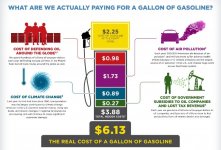You don't understand what government welfare is all about. Oil companies do not get corporate welfare. Planned Parenthood, on the other hand, gets corporate welfare and government funding.
Here is a summary of the 2011 oil industry subsidies compiled by Taxpayers for Common Sense in its report, "Subsidy Gusher."
- Volumetric Ethanol Excise Tax Credit - $31 billion.
- Intangible Drilling Costs - $8.9 billion.
- Oil and Gas Royalty Relief - $6.9 billion.
- Percentage Depletion Allowance - $4.327 billion.
- Refinery Equipment Deductions - $2.3 billion.
- Geological and Geophysical Costs Tax Credit - $698 million.
- Natural Gas Distribution Lines - $500 million.
- Ultradeepwater and Unconventional Natural Gas and other Petroleum Resources R&D - $230 million.
- Passive Loss Exemption - $105 million.
- Unconventional Fossil Technology Program - $100 million.
- Other subsidies - $161 million.
:max_bytes(150000):strip_icc()/Elly_Lange-56a9a6153df78cf772a9368e.jpg)
What Are Government Subsidies?
Subsidies are cash grants or loans used to encourage or promote certain behaviors. Learn about government subsidies in oil, farming, health care, and more.
Every year, oil companies get to deduct millions of dollars from their tax bills for the cost of new wells, oil exploration, and other drilling and mining expenses.
How Corporate Welfare Hurts You
When corporations get special handouts from the government, we have to pay more in taxes to make up for these hidden tax breaks, subsidies, and loopholes.









